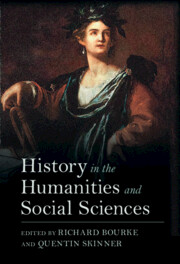Book contents
- History in the Humanities and Social Sciences
- History in the Humanities and Social Sciences
- Copyright page
- Contents
- Figures
- Contributors
- Acknowledgements
- Introduction
- 1 Law and History, History and Law
- 2 History, Law and the Rediscovery of Social Theory
- 3 The Uses of History in the Study of International Politics
- 4 International Relations Theory and Modern International Order: The Case of Refugees
- 5 The Delphi Syndrome: Using History in the Social Sciences
- 6 Power in Narrative and Narratives of Power in Historical Sociology
- 7 History and Normativity in Political Theory: The Case of Rawls
- 8 Political Philosophy and the Uses of History
- 9 The Relationship between Philosophy and its History
- 10 When Reason Does Not See You: Feminism at the Intersection of History and Philosophy
- 11 On (Lost and Found) Analytical History in Political Science
- 12 Making History: Poetry and Prosopopoeia
- 13 Reloading the British Romantic Canon: The Historical Editing of Literary Texts
- 14 Economics and History: Analysing Serfdom
- 15 The Return of Depression Economics: Paul Krugman and the Twenty-First-Century Crisis of American Democracy
- 16 Anthropology and the Turn to History
- Index
- References
4 - International Relations Theory and Modern International Order: The Case of Refugees
Published online by Cambridge University Press: 08 December 2022
- History in the Humanities and Social Sciences
- History in the Humanities and Social Sciences
- Copyright page
- Contents
- Figures
- Contributors
- Acknowledgements
- Introduction
- 1 Law and History, History and Law
- 2 History, Law and the Rediscovery of Social Theory
- 3 The Uses of History in the Study of International Politics
- 4 International Relations Theory and Modern International Order: The Case of Refugees
- 5 The Delphi Syndrome: Using History in the Social Sciences
- 6 Power in Narrative and Narratives of Power in Historical Sociology
- 7 History and Normativity in Political Theory: The Case of Rawls
- 8 Political Philosophy and the Uses of History
- 9 The Relationship between Philosophy and its History
- 10 When Reason Does Not See You: Feminism at the Intersection of History and Philosophy
- 11 On (Lost and Found) Analytical History in Political Science
- 12 Making History: Poetry and Prosopopoeia
- 13 Reloading the British Romantic Canon: The Historical Editing of Literary Texts
- 14 Economics and History: Analysing Serfdom
- 15 The Return of Depression Economics: Paul Krugman and the Twenty-First-Century Crisis of American Democracy
- 16 Anthropology and the Turn to History
- Index
- References
Summary
This chapter examines the proposal that theories of international relations provide an invaluable resource for comprehending the politics of forced migration. To interrogate this proposition, the essay takes up the question of how forced migration, came to be written out of the study of international politics in the first place. This development, the essay argues, contributed to a fundamentally static vision of international order, a fact that has a significant bearing on the proposition that IR possesses unique intellectual and conceptual resources to grapple with the challenges introduced by climate migration. In evaluating the larger proposal to draw on the resources of IR to comprehend an emergent crisis, the further question to consider is what a revised historical account of international order implies for the proposal that theories of international relations can illuminate the present dynamics of global politics. As this essay argues, a consideration of the common enterprise undertaken by historical IR scholars and historians to historicize the dominant representations of international politics indicates the virtues of conceiving of IR theory as a distinct resource for analytically grasping the global political implications of climate migration.
Keywords
- Type
- Chapter
- Information
- History in the Humanities and Social Sciences , pp. 90 - 115Publisher: Cambridge University PressPrint publication year: 2022

